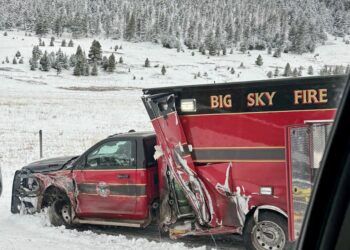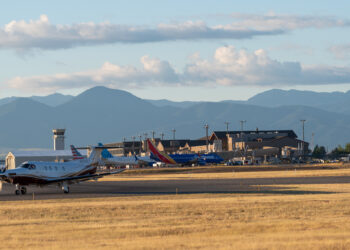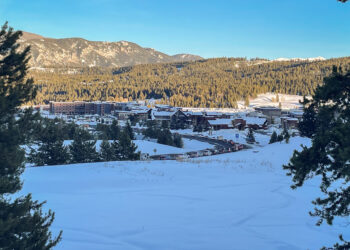Profile of a small-town sheriff
Story and photos by Allen Morris Jones EBS Contributor
Not sure why, but I’ve always been curious about small town cops, the work they do. Maybe it comes from a slightly wayward childhood in Livingston. I’ve never been arrested, never put in cuffs, but I’ve come thiiiss close. Nothing serious, just the delinquent, late-night mistakes you make as a kid growing up in Montana. “Hey, guys! Watch this!” It turns out that God not only looks after drunks and small children, but teenagers with fake IDs as well.
My notions about law enforcement, then, during my early years – middle class and mostly well behaved, dipping the occasional toe over into truancy – were … complicated. My folks had an art gallery. The burglar alarm would go off, the cops would show up within five minutes, lights flashing. That was good. They were always polite.
But then, late at night, sneaking a sixer with buddies and watching a city cop take a slow turn through the high school parking lot, spotlight swinging around… Of all the possible jobs a guy could choose, who would decide on this one? Protect and serve was stenciled on the car doors, but that seemed to me misleading. Protecting and serving…whom? Not me, not us, not the underage drinkers.
Who were those guys?
__________
Fast forward 25 or 30 years, and Deputy Sheriff Dan Birdsill is showing me around his beat, around Madison County, Montana. I’m in the front seat, crowded by a rubberized laptop, staring at the radar assembly on his dash. The radar gun itself – about twice the diameter of a pop can – feeds into a modem-sized console that shows a readout of both our vehicle’s speed as well as the speed of oncoming vehicles.
The box gives off a faint, feedback whine of an old computer trying to find a modem connection. My eye keeps catching it.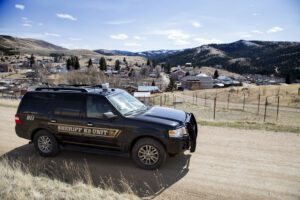
Madison County. Cupped by competing mountain ranges, this is God’s country, unironically. Where Montana’s written history got its start; where the state’s first mining towns went boom and bust, where the first bandits took long drops on short ropes and the first of the state’s politicians pounded their podiums.
These days, trophy homes overlook mine tailings, and roadside stands offer tourists a chance to pan for garnets. In the off-season, there’s not quite 8,000 folks in the county, some of them miners, a good portion of them full-time recreationalists. If you’re in law enforcement, it makes for a misleading calm. People from disparate backgrounds, different social and economic strata, jostling each other for a measure of position.
We start the day by taking a few turns around the tiny towns of Harrison and Pony. “I try not to make a habit of the same routine. People like to see you. Like to know you’re about,” says Dan, idling along, in no hurry one way or the other.
If you’ve spent time in Ennis or Virginia City, you’ve likely caught a glimpse of Dan. He’s the K9 officer. His dog Shay, an 11-year-old Belgian Malinois graying around the face, rides in a kennel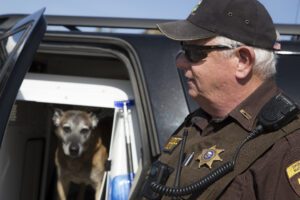
There is no drama here. This isn’t a story. I’m interested in who; less curious about why, when, where, and how. “My dog and I try to be ambassadors,” Dan says, “try to say we’re the ones you run to, not the ones you run from. I feel like that’s an important lesson for the younger folks … ” Coming out of Pony, dispatch interrupts. “25-4, 25-4, come in please.” Dan pulls over, clicks his radio’s handset. “Go ahead.”
“We have a call from Sheridan, verbal threats between neighbors. Both parties are still on site.” The voice passes along a name, address, phone number.
“Okay, I’m on the Madison now. I’ll make my way over there.”
“Roger that.”
He opens his laptop. Types a few lines. “In the computer system, this is a call for service. If it was a criminal case, we’d call it an incident.”
Dan grew up in Sheridan, born and raised, third generation. “The kids that grew up here, used to be, they’d stick around. They worked mining, lumber, whatever they could find. My dad, he spent his time in the service, in France and Germany in World War II. Came home to work the mines. He was a welder, and a shift boss at a phosphate mine for twenty years.”
Dan himself started out at the talc mine, a certified diesel mechanic, a certified welder, crane operator. But he quit after the mine first gave him permission to attend the law enforcement academy and then later tried to demote him for taking the time off.
“I went from making over $20 an hour – and in 1993 that was a pretty good wage – to about half that for the sheriff’s department. And I didn’t regret it a minute. What’s your peace of mind worth?”
Thirty years into the job, Dan seems to know the people he works for, the citizens of Madison County, as well as I know my own neighbors. Passing a young woman in a white Fiat, he says regretfully, “I’ve had to give her two different DUIs.”
During the course of the day, I watch Dan placate the warring neighbors (nodding sympathetically, letting them talk out their anger), do a welfare check on an elderly woman whose grandson was worried that she wasn’t answering her phone (Dan to dispatch: “Everything’s code 4 here. Her phone’s just been out of order.”), and chastise a local who’d been tossing debris out into the middle of the road to discourage speeders.
Dan says at one point, “Boils down to it, there’s just too many people with not enough to do.”
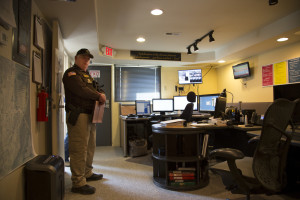
Dan says, “If you can’t be decent to people, you’re not doing the job for the right reasons.” He considers it, then adds, “I always tell the new guys, you have to ask yourself, am I doing the right thing at the right time in the right way for the right reasons?”
We are at a moment of crisis in the culture at large. Cameras on phones and YouTube in your hip pocket, the evidence of police abuse is only as far as the next hyperlink. If you let it, it’s enough to turn you jaded, sour. The bad eggs threaten to cast a shadow over an entire profession. But consider where we would be without the rest of them. The tens of thousands of folks who serve without any real recognition, commendation, or applause.
These days, holding my four-year-old’s hand, walking him toward the playground (keeping an eye out for speeders, broken bottles, swerving drunks), glimpsing a cruising patrol car lifts my spirits a bit. Who do these guys protect and serve? Me, you, us. I’m only sorry that it’s taken me this long to feel grateful for it.
A writer, editor, and photographer, Allen Jones currently lives and works just west of Bozeman.






